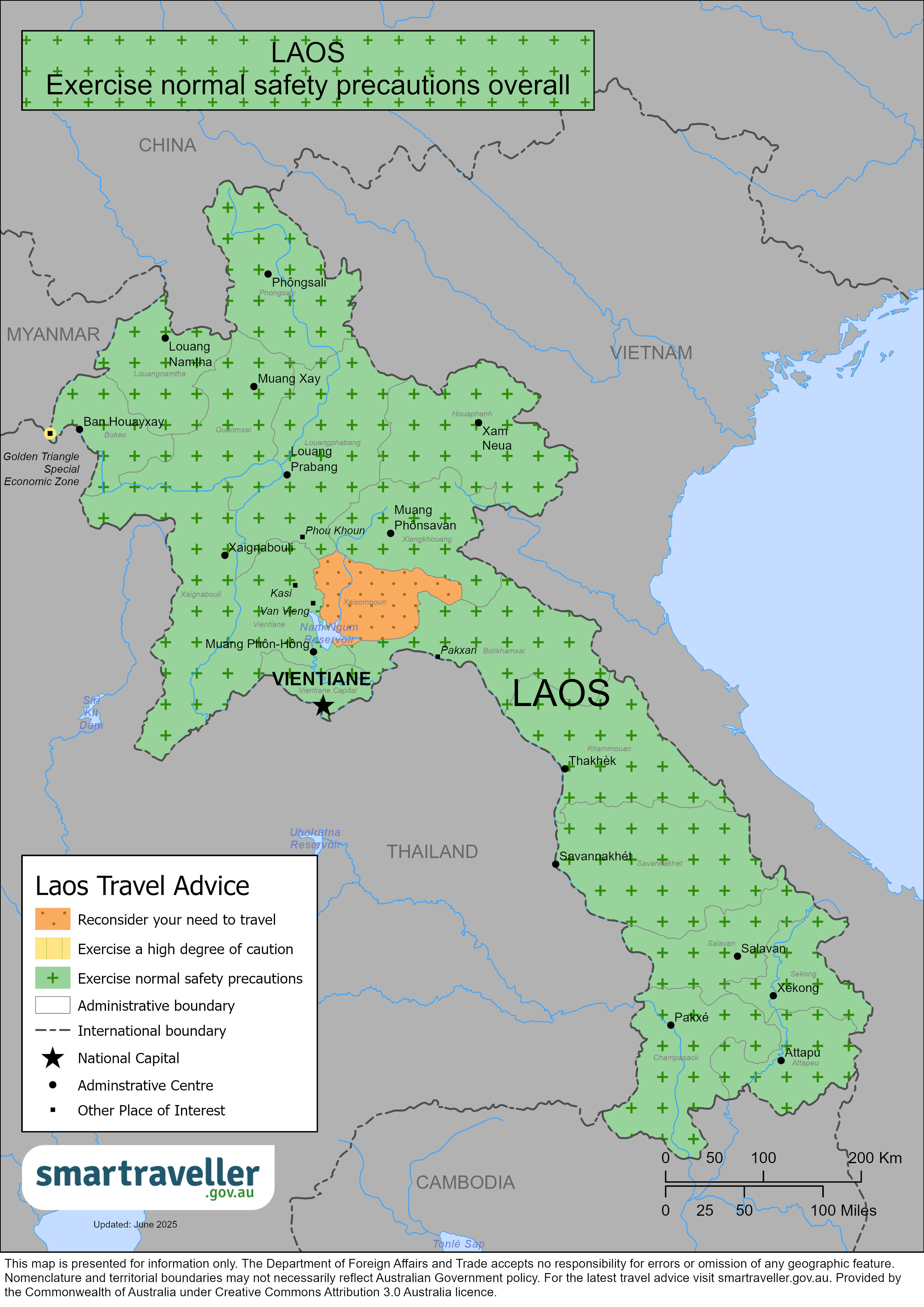Mekong Riverbank, Vientiane
The Mekong Riverbank in Vientiane is a border of Laos and Thailand. It's a known smuggling route. Lao and Thai border security strictly patrol it. Anyone suspected of smuggling will be questioned and may be detained.
Take extra care along the Mekong Riverbank in Vientiane.
The riverbank has a 10.30pm curfew. If you're in the area after 10.30pm, you could face:
- a fine
- questioning
- arrest
- detention
Driving permits
You can drive in Laos with a valid:
- International Driving Permit (IDP). An Australian driver's licence is not valid
You must get your IDP before leaving Australia.
More information:
Road travel
Road travel in Laos can be dangerous. Lao road rules may operate differently to road rules in Australia. Traffic can be unpredictable. Hazards include:
- poorly maintained roads and vehicles
- local driving practices and drink driving
- livestock on roads
- a lack of road lighting
The number of road accidents and deaths has increased in recent years. Accidents at night and those involving motorcycles are common.
Police often check drivers in towns and in rural areas. If you don't provide identification (ID) when asked, police could fine or detain you.
Before driving:
- check your travel insurance policy covers you
- learn about local traffic laws and practices
While you're on the road:
- always carry photo ID
- drive carefully and legally
- don't drink and drive
- take only well-used, well-lit roads
- be alert to bandits along rural roads, especially Routes 6 and 7
- obey curfews
Avoid driving at night if you can, especially on rural roads.
More information:
Motorcycles
Riding motorcycles is one of the riskiest activities for travellers. Always wear a helmet and sensible clothing. Never ride or drive while under the influence of alcohol or drugs.
If you plan to ride a motorcycle:
- check your travel insurance policy covers motorcycle
- use a well-known hire company with a good reputation
- check the rental contract to make sure the vehicle is insured for damage and theft
- don't provide your passport as a deposit or guarantee
- take date-stamped photos of your vehicle before you hire it to record any existing damage
Always wear a helmet. See Safety
Taxis
There are few taxis in Laos. Where possible, use official taxis or reputable ride-sharing companies that can be booked by phone, app or at major hotels or inside airports. Don't share taxis with strangers.
Be alert to possible scams and safety risks. Riding in tuktuks (motorised 3-wheel vehicles) or on motorcycle 'taxis' brings extra safety and security risks.
Make sure you agree on both the fare and route before taking:
- an unmetered taxi
- a tuktuk
- a motorcycle taxi
Secure your belongings while travelling in tuktuks or on motorcycles.
Public transport
Local vehicles and roads don't always meet Australian safety standards. Serious accidents do happen.
Inter-city bus networks are the main public transport option in Laos. However, the service isn't reliable in some parts of the country.
More information:
Boat travel
Boats travelling on the Mekong River in the area between China, Laos, Myanmar and Thailand have been robbed and shot at. It can be dangerous to travel on the Mekong River due to changing weather conditions and hidden obstacles. Boat and ferry accidents have occurred. Transport and tour operators don’t always follow safety and maintenance standards.
If you plan to travel by boat or ferry:
- make sure it has appropriate safety equipment, GPS and communication equipment, and life jackets
- wear a life jacket at all times
- take enough life jackets for all children travelling with you
- ask your tour operator or crew about safety standards before you travel
- check river, weather conditions and forecasts before embarking on boat or ferry travel, and delay travel if conditions are not safe
If appropriate safety equipment isn't available, use another provider.
More information:
Air travel
DFAT doesn’t give advice about how safe different airlines or flight paths are.
Safety risks and weather events may cause flight delays and cancellations. Contact your travel agent or airline to confirm your plans.
Airlines and airports can restrict what you can take in your luggage. Regulations may be different to those in Australia. Check with your airline before you travel.
Check Laos's air safety profile with the Aviation Safety Network.
More information:
Travelling alone
If you're travelling on your own and not part of a tour group, find out about travelling to specific areas. Provincial or district offices can provide this advice.
If you want to camp, get permission from local authorities in advance.
Authorities may set and strictly enforce curfews in some provinces. Contact provincial or district authorities about where and when curfews are in place.
Follow instructions of local authorities. If you don't, they could fine, arrest or detain you.



